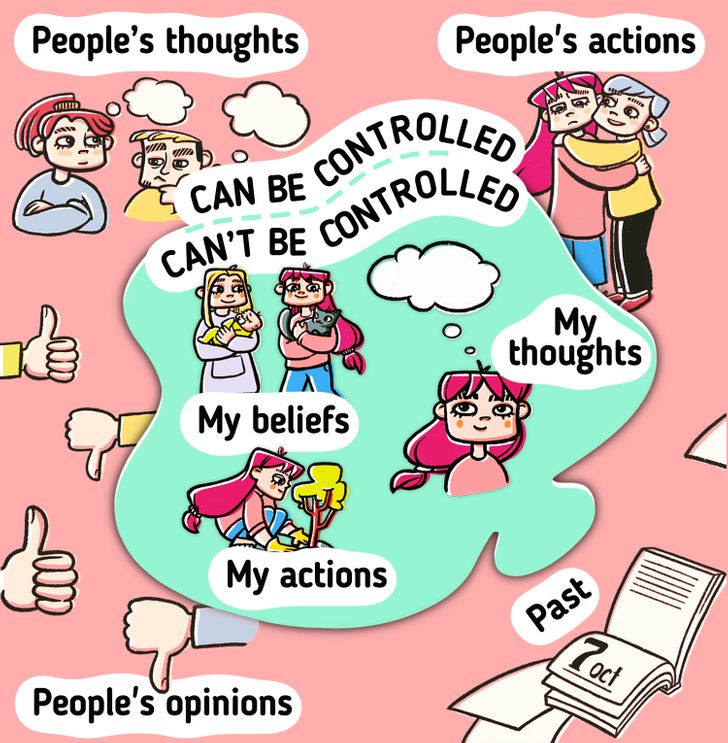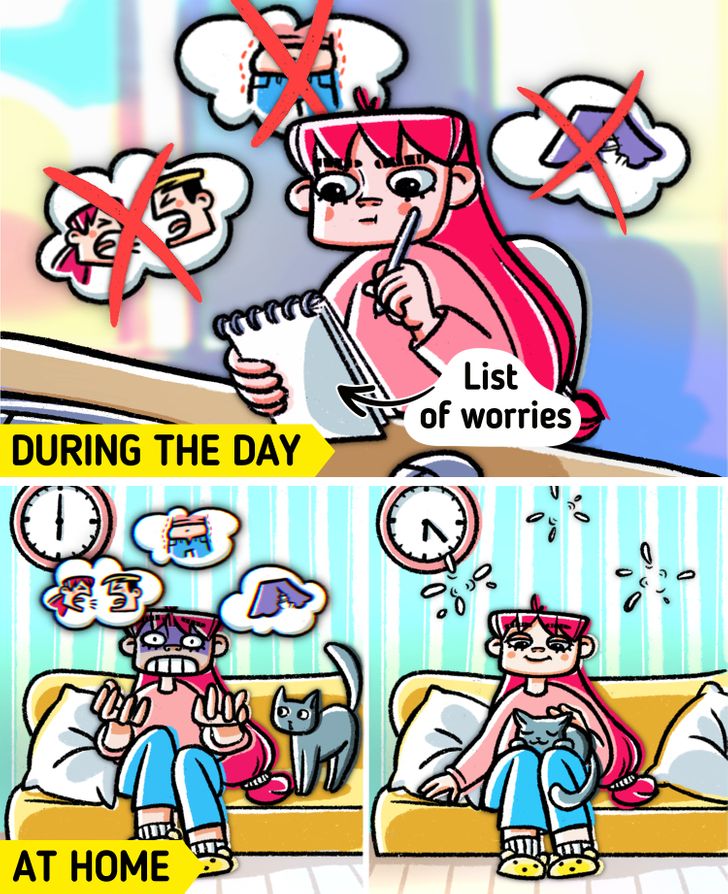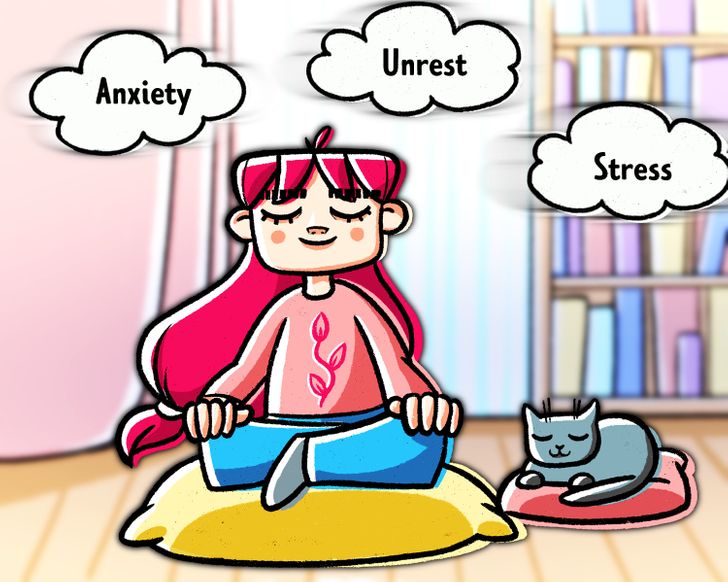How to Stop Worrying About the Things You Can’t Change
When we worry about something, people always tell us, “Don’t worry about the things you can’t control.” In theory, it sounds simple, but it’s actually really hard to do. The absence of control makes you feel disappointed and helpless. We start worrying and do useless actions to try and do at least something. Of course, it doesn’t do anything but make the situation worse and increase the feeling of anxiety.
5-Minute Crafts knows what to do to deal with the anxiety over things we can’t change.
Learn to recognize the things that are out of your control.

There are certain situations you can’t do anything about. It doesn’t mean you should just do nothing and let anything happen to you. The idea of controlling nothing is just as absurd as thinking that you control everything. The ability to find a balance between these states is the path to harmony and an anxiety-free life.
Here are a few things that there’s no point worrying about.
- What other people think: You can only be sure about what you think. When it comes to other people, you only have the information they share with you. And if they say things you disagree with, there are only 2 ways to deal with it: change their opinion by arguing, or make peace with the fact that people might disagree with you.
- The past: You have some control over your future, but the past can’t be changed. If the mistakes you did in the past still worry you, the only thing you can do is accept your past and the fact that you can’t change it. Make conclusions and avoid making the same mistakes in the future.
- “What if?” situations: Your future is partially determined by your actions. But it also depends on the actions of other people that you can’t predict or control. Instead of focusing on the things others do, focus on what you do and think. If you distract your attention from the variables you can’t control (other people) and switch it to a more controllable thing (your own decisions), it will decrease your anxiety.
Replace anxious thoughts with questions of whether or not you can benefit from them.

If you’re often anxious, you probably overestimate the probability of a negative outcome. You switch to the worst possible scenarios or treat every worrying thought as if it’s a fact. Additionally, you might discredit your ability to deal with life problems, thinking you will fall apart as soon as you have any. This is called cognitive distortion. It includes the following:
❌ You think in terms of “all or nothing.” You see things only in black and white.
“If not everything is perfect, I’m a loser.”
❌ You generalize a single negative experience. You expect it to be the only one you have.
“They didn’t hire me. I’ll never find a job.”
❌ You focus on the bad stuff, ignoring all the good things. You just focus on the negatives.
“I didn’t answer the last test question. I’m stupid.”
❌ You devalue positive things.
“I did well with the presentation but it was nothing more than luck.”
❌ You make negative interpretations without any proof.
“I know she secretly hates me,” or “I’m convinced something terrible will happen.”
❌ You expect the worst-case scenario to play out.
“The pilot said we’re in turbulence. Something bad is definitely going to happen!”
❌ You believe that your feelings always reflect reality.
“I feel like a fool. Everyone must be laughing at me.”
❌ You have a list of things you can and can’t do. You punish yourself for not following the rules.
“I shouldn’t have tried to talk to her. I’m ridiculous.”
❌ You label yourself based on supposed drawbacks.
“I’m a boring loser. I deserve to be alone.”
❌ You feel responsible for things outside your control.
“It’s my fault my son got in a car accident. I should have told him to be more careful driving in the rain.”
To fight these negative thoughts, ask yourself:
✅ “Is my idea right? Is there any proof? Maybe I’m wrong.”
✅ “Is there a more positive and realistic way to look at the situation?”
✅ “What’s the probability of the things I’m afraid of happening?”
✅ “What are the consequences of this thought for me? How will worrying about it affect me?”
✅ “If my friend had the same concerns, what would I tell them?”
Give yourself “time to worry” every day.

It is hard to be productive when you have worrying thoughts throughout the entire day. There’s a strategy of postponing the worrying. Let yourself worry about something, but later.
- Choose a time and place for worrying. They should be the same every day, for example, in your living room from 6 p.m. to 6:20 p.m. During this time period, you can worry about anything you want. Just make sure it’s not right before going to bed. The rest of the day is a worry-free zone.
- Write down the things that concern you. If you start worrying about something during the day, make a note and then continue to do your job. You will have time to worry about it later but not right now. Besides, there’s a chance you will stop worrying after you write it down.
- During the allotted “worrying time,” check the list of your worries. If the thoughts you wrote down still worry you, let yourself think about them, but only during the worry time. The more you practice this analysis, the easier it will be for you to work out a more balanced view of things.
Practice mindfulness.

Anxiety is usually focused on the future, like the things that can happen, your actions, or the past, thinking about what you said or did. Mindfulness helps rid your mind of these things and focus on right now. This strategy is based on looking at your worries and letting them go.
- Watch your worries. Don’t try to ignore, control, or fight them as you usually do. Instead, just look at them from the side, without reacting or judging.
- Let your worries go. When you are not trying to control the worrying thoughts, let them pass by like clouds in the sky.
- Focus on the real things. Pay attention to how your body feels, how you breathe, what you feel and think. If you find yourself focusing on something, get back to reality.
- Practice every day. Using mindfulness to remain focused can actually help, but it takes time and practice. It will be hard at the beginning, but don’t get discouraged. Every time you pay attention to the present moment, you make your mental habit stronger to get out of the negative cycle.
Use positive affirmations.

Affirmations can help you react to the thoughts you have correctly: either act or calm down. Every time you think something like, “I hope I’ll do well today,” say to yourself, “I’ll make sure I do well today.” It will remind you that you can control your actions.
If you start thinking about the things you can’t control, like “I hope it doesn’t rain on Saturday,” say to yourself, “If it does, I’ll deal with it.” This short phrase will help you not waste your time worrying about the things you can’t change.
Either you do everything you can to make something you want happen, or accept the fact that something can happen and you can’t control it.